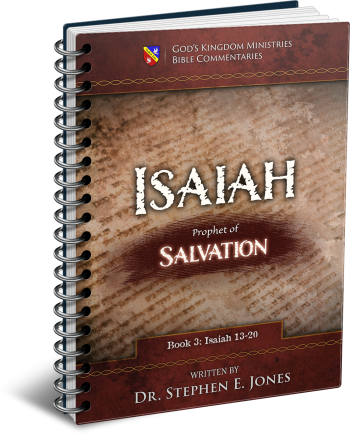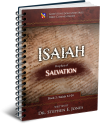Latest Posts
View the latest posts in an easy-to-read list format, with filtering options.

Isaiah is the prophet of Salvation. He is also known as the truly "Universalist" prophet, by which is meant that He makes it clear that salvation is extended equally to all nations and not just to Israel. He lived to see the fall of Israel and the deportation of the Israelites to Assyria, and he prophesied of their "return" to God (through repentance). He is truly a "major prophet" whose prophecies greatly influenced the Apostle Paul in the New Testament.
Category - Bible Commentaries

Isaiah 17 is an Oracle against Damascus. It speaks of the destruction of Damascus and this is contrasted with God’s treatment of Ephraim (i.e., Israel). Whereas Damascus was to be utterly destroyed, a surviving remnant (“gleanings”) were to remain in Ephraim.
Isaiah 17:1, 2 says,
1 The oracle concerning Damascus. “Behold, Damascus is about to be removed from being a city and it will become a fallen ruin. 2 The cities of Aroer are forsaken. They will be for flocks to lie down in, and there will be no one to frighten them.”
Amos had been the first to prophecy the destruction of Damascus, telling us that its inhabitants would be exiled to Kir (Amos 1:5). This was fulfilled in the time of King Ahaz of Judah, when the Assyrians took the city, killed its king, and exiled the people to Kir (2 Kings 16:9).
Yet the destruction was not so complete as to be permanent, for a century later the prophet Jeremiah said that it had walls (Jer. 49:27) that were to be “burned” by the Babylonians. Ezekiel, who was Jeremiah’s contemporary, describes the commerce of Damascus (Ezekiel 27:18). It was again rebuilt later, and after the Babylonian captivity, the prophet Zechariah spoke of Damascus as a city (Zech. 9:1).
Hence, Damascus was a prominent city in the days of the early church (Acts 9:1, 2), for Saul was traveling there to arrest the Christians when he was arrested and conscripted by Jesus Himself (Acts 9:3).
It is not fully clear if Isaiah was telling us that Damascus was to be destroyed permanently at some point in history or if the earlier destructions completed the prophecy. What does the word mean when it says, “it will become a fallen ruin”? Unlike the prophecy about Jerusalem in Jer. 19:11, the Damascus prophecy does not specifically state that the city will never again be repaired or rebuilt.
Nonetheless, with the advent of nuclear weapons in the hands of the Israeli military, the utter destruction of Damascus is a distinct possibility in the inevitable conflict, perhaps at the time of Jerusalem’s destruction. Many in the Israeli military think in terms of the so-called “Samson Option.” This is the idea that if we can’t have this land, no one can, and if Jerusalem is in danger of destruction, we will nuke twelve neighboring cities, including Damascus.
If we are to take Isaiah’s prophecy to mean that Damascus will be destroyed permanently in the future, then it is likely that the city will be destroyed about the same time that Jerusalem is destroyed. Damascus was traditionally the cultural center of Islamic religion, so it is unlikely that an Islamic nation would destroy the city. Neither is it likely that Russia or China would have a motive to destroy Damascus.
The US government, influenced heavily by the Israelis, have stirred up trouble in Syria by backing rebel factions. In their attempt to overthrow President Bashar al-Assad, the war has already destroyed parts of Damascus. The devastation is evident, but this does not seem to fulfill the scope of destruction that Isaiah foresaw.
That leaves the Israeli military as the clear option.
Isaiah includes “the cities of Aroer” in its prophecy. These cities will be “forsaken” (Isaiah 17:2), that is, deserted. This is probably a prophecy about their Assyrian exile to Kir. The name Aroer itself means “ruins,” coming from the root word arar, “to strip, lay bare.” How did it get this name? Was it a later name that was given after its destruction? Was the city built upon the ruins of an older city? We do not know.
There were three other cities that were called Kir. One was in the territory of Reuben (Deut. 2:36) that was taken over from Sihon, king of the Amorites (now called Arair). Another was a city in Ammon near the Jabbok river that was part of the territory of the tribe of Gad (2 Sam. 24:5). A third Aroer was a town in southern Judah (1 Sam. 30:28).
Many towns had the same name, even as we see today. But Isaiah was prophesying about a region in Syria which apparently had multiple cities. The prophet sees these cities as being uninhabited at some point, though perhaps not totally destroyed, because shepherds would be able to use the houses as sheepfolds. No one would be there to frighten away the sheep.
Isaiah 17:3, 4 says,
3 “The fortified city will disappear from Ephraim, and sovereignty from Damascus and the remnant of Aram [Syria]; they will be like the glory of the sons of Israel,” declares the Lord of hosts. 4 In that day the glory of Jacob will fade…
Here the prophet compares Israel with Damascus, both of which were conquered and exiled to various parts of the Assyrian empire. Syria, with its capital in Damascus, was to “be like the glory of the sons of Israel,” which, in the next verse is said to “fade.”
The prophet then interrupts his Moabite prophecy with a section that focuses upon Ephraim-Israel (verses 4-10). Afterward, the prophet concludes his prophecy about Damascus and Syria (verses 11-14).